dermatitis relief
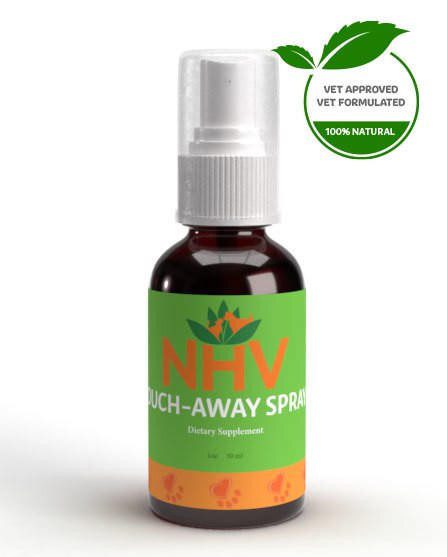
free shipping over $100 (USA & Canada)
1-877-937-4372 the pet expert hotline
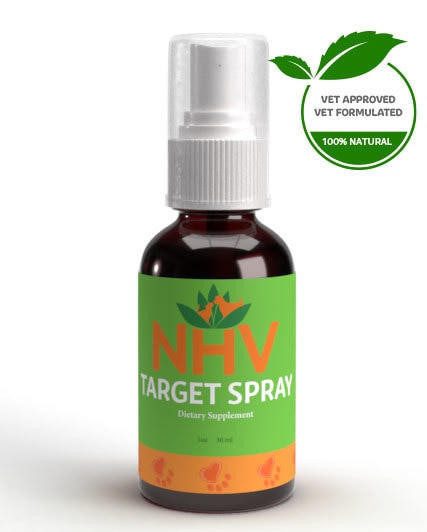

Cheyletiellosis is a skin condition caused by Cheyletiella mites. This is a type of mite that is visible to the naked eye and appears as white flakes moving on the skin. Because of this trait, it has the nickname “walking dandruff.” Even though people mistake it for simple dandruff, Cheyletiellosis in pets can be an infestation that can cause significant discomfort if not treated.
The most common symptoms of Cheyletiellosis in pets include flaky skin, intense itching, and thinning hair. In some cases, the pet may also develop redness or scabs from excessive scratching.
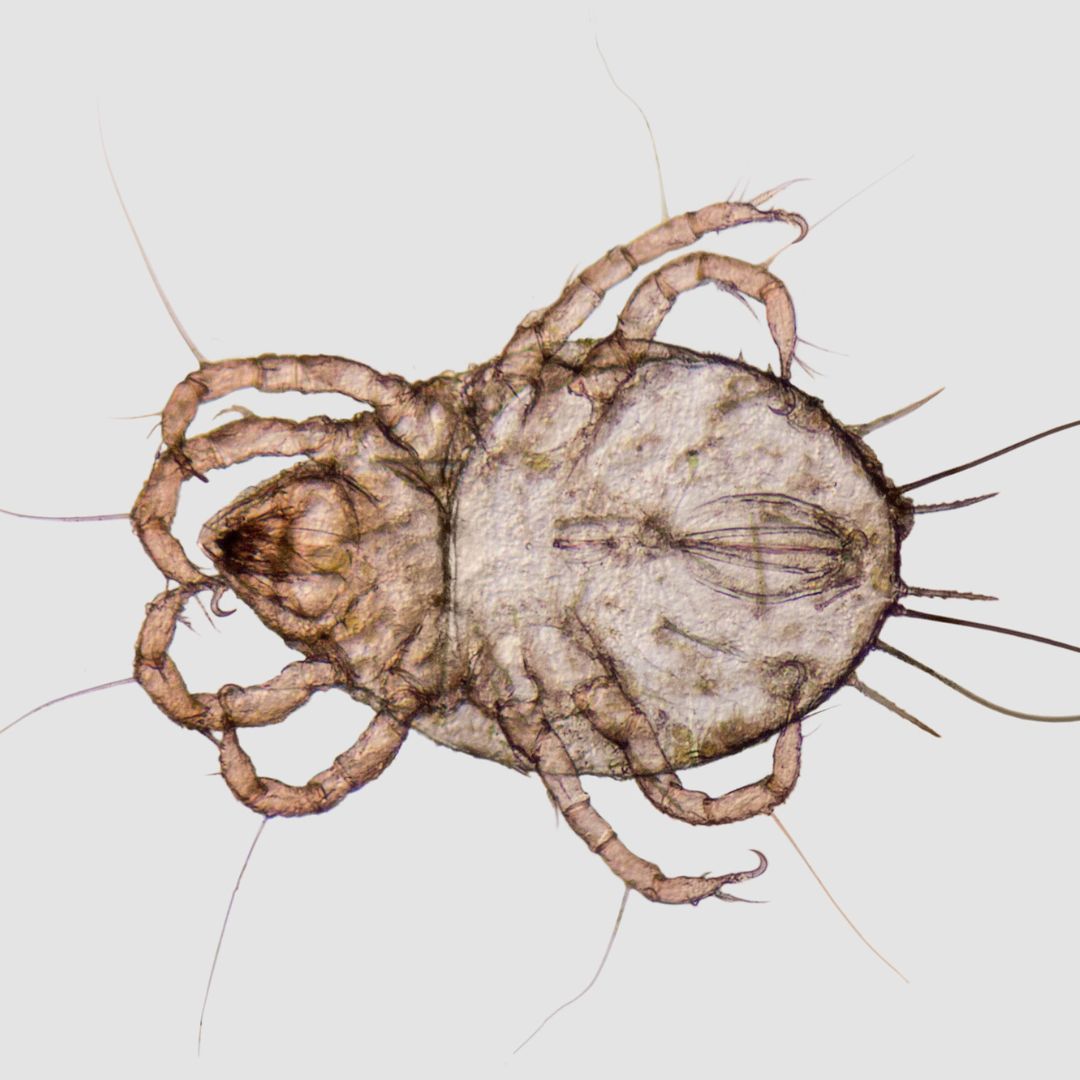
It is important to note that this condition can be spread very easily through direct contact with an infested pet or contaminated bedding, grooming tools, or environments. While Cheyletiella mites prefer animals, in some rare cases, humans may experience temporary skin irritation after contact, making it a zoonotic concern.
As Cheyletiellosis can resemble many other skin conditions, it is crucial to have confirmation from a vet. It is often done through skin scrapings or tape impressions under a microscope. The conventional treatments normally include topical or oral anti-parasitic pharmaceuticals.
Along with veterinary care, natural support for pets with Cheyletiellosis can help ease discomfort and promote skin healing. Several peer-reviewed studies highlight the value of plant-based and holistic ingredients in managing mite infestations and skin inflammation, for example:
Preventing Cheyletiellosis will require a combination of environmental management and support to the immune system. As a pet parent, you should wash your fur baby’s bedding regularly. Vacuum frequently, and sanitize grooming tools to minimize the risk of reinfestation.

Also, regular grooming may help in monitoring for early signs of skin changes. In addition to those measures, incorporating natural support into daily care, like PetOmega 3, Natures Immuno, Target Spray, and/or Ouch Away Spray for skin health or immune-supportive herbs, can be part of a proactive wellness plan.
By combining veterinary care with holistic strategies, you can provide comprehensive support for you little one affected by Cheyletiellosis. The good news is that with patience, consistency, and compassion, even the itchiest cases of “walking dandruff” can be managed effectively.
dermatitis relief

Holistic Support for Dermatitis, Mange and Yeast Infections
buy 2 and save $3
Your furkiddo’s skin can be sensitive to things like environmental allergies, biting insects, fungal overgrowth and much more! To self-soothe, your pup may start to bite, lick, or scratch themselves causing inflammation and possible hair loss. NHV Ouch Away, dog skin infection spray, helps your pup get on top of skin and coat issues naturally.

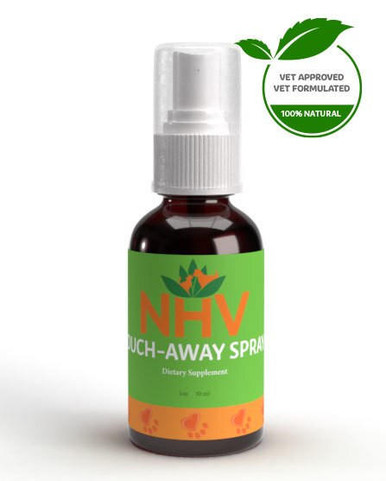
Your furkiddo’s skin can be sensitive to things like environmental allergies, biting insects, fungal overgrowth and much more! To self-soothe, your pup may start to bite, lick, or scratch themselves causing inflammation and possible hair loss. NHV Ouch Away, dog skin infection spray, helps your pup get on top of skin and coat issues naturally.

Natural Support for Dermatitis, Mange and Skin Infections
Your pup's skin is their largest organ! And because of this, their skin is constantly susceptible to infection, airborne irritants, icky biting insects and much more. Your furkiddo will scratch and bite when they are feeling stressed and have ouchies on their body. This obsessive behavior can introduce unwanted bacteria, whether it is from the environment or your pup’s own body, which can lead to infection. An itchy, inflamed ‘dog hot spot’ can be the end result. If these dog hot spots are left untreated, they can progress to secondary skin infections, abscesses or even metastatic tumors (eg. carcinoma). Ouch Away spray, dog skin infection spray, helps heal inflamed, itchy skin and promotes hair regrowth.
How NHV's Dog Skin Infection Spray Relieves Irritated Skin
Since your pup’s skin is their largest organ, it probably doesn't surprise you that skin issues are the most common health concern in dogs. These include (but are not limited to) dermatitis, mange and skin infections.
Dermatitis in dogs is a hypersensitivity or allergic reaction to a variety of common and typically harmless environmental substances. These allergens include grasses, pollens, house dust mites, or mold spores. Breeds predisposed to developing allergies include Chinese Shar-Peis, Wire Fox Terriers, Golden Retrievers, Dalmatians, Boxers, Boston Terriers, Labrador Retrievers, Lhasa Apsos, Scottish Terriers, Shih Tzus, and West Highland White Terriers. However, any breed (purebred or mixed) can be susceptible to allergies. The areas most affected are generally the paws, face, ears, front legs, and abdomen, but scratching all over the body is fairly common too. Ouch Away Spray for dog skin infections, contains ingredients like Chamomile, Marigold and Aloe vera that cools and soothes wounds, burns and irritated skin while strengthening the immune system.
The most common signs of dermatitis in dogs are:
Dog mange is caused by mites and can lead to inflamed skin and nasty sores. Scabies or sarcoptic mange is contagious and is transmissible to humans. Black mange is not transmissible to humans due to it being a genetic condition. Secondary bacterial and yeast infections may develop if left untreated while sores on the skin can build up and release a powerful musty odor. You can learn more about mange and how to help your dog if they are suffering from it in Dr. Cook's article on mange. Ingredients like Rosemary, Tea Tree oil and Lemongrass oil, within the Ouch Away Spray, are effective topically against external parasites, combating skin infections and helping to stimulate fur regrowth (from constant biting and scratching).
Help Support Your Dog Naturally
NHV Ouch Away Spray, dog skin infection spray, is an effective topical spray that is 100% natural and vet-formulated to soothe your pup’s skin, coat issues, and dog hot spots. To learn more about what causes dog hot spots and how to help your furry friend, read our vet talk or watch our video about skin infections. Get in touch with an NHV pet expert if you have any questions or concerns about skin and coat health - we are always here to help!
Made with the finest, organically grown, or ethically harvested herbs. Made specifically for pets, vet-formulated and vet approved.
How to Administer
Topical Spray: Spray several times a day to affected area until healed. It may some times be necessary to shave or trim your pet’s hair so that the Ouch Away spray reaches the affected area. If necessary, cover the affected area with gauze dressing.
Caution
Do not spray near or into eyes or nose. May initially sting on an open cut. A vet examination prior to use of this product is recommended. If your pet’s condition does not improve or deteriorates consult your vet and stop the use of the product.
Information presented by NHV Natural Pet Products is for educational purposes only.
Natural Support for Dermatitis, Mange and Skin Infections
Your pup's skin is their largest organ! And because of this, their skin is constantly susceptible to infection, airborne irritants, icky biting insects and much more. Your furkiddo will scratch and bite when they are feeling stressed and have ouchies on their body. This obsessive behavior can introduce unwanted bacteria, whether it is from the environment or your pup’s own body, which can lead to infection. An itchy, inflamed ‘dog hot spot’ can be the end result. If these dog hot spots are left untreated, they can progress to secondary skin infections, abscesses or even metastatic tumors (eg. carcinoma). Ouch Away spray, dog skin infection spray, helps heal inflamed, itchy skin and promotes hair regrowth.
How NHV's Dog Skin Infection Spray Relieves Irritated Skin
Since your pup’s skin is their largest organ, it probably doesn't surprise you that skin issues are the most common health concern in dogs. These include (but are not limited to) dermatitis, mange and skin infections.
Dermatitis in dogs is a hypersensitivity or allergic reaction to a variety of common and typically harmless environmental substances. These allergens include grasses, pollens, house dust mites, or mold spores. Breeds predisposed to developing allergies include Chinese Shar-Peis, Wire Fox Terriers, Golden Retrievers, Dalmatians, Boxers, Boston Terriers, Labrador Retrievers, Lhasa Apsos, Scottish Terriers, Shih Tzus, and West Highland White Terriers. However, any breed (purebred or mixed) can be susceptible to allergies. The areas most affected are generally the paws, face, ears, front legs, and abdomen, but scratching all over the body is fairly common too. Ouch Away Spray for dog skin infections, contains ingredients like Chamomile, Marigold and Aloe vera that cools and soothes wounds, burns and irritated skin while strengthening the immune system.
The most common signs of dermatitis in dogs are:
Dog mange is caused by mites and can lead to inflamed skin and nasty sores. Scabies or sarcoptic mange is contagious and is transmissible to humans. Black mange is not transmissible to humans due to it being a genetic condition. Secondary bacterial and yeast infections may develop if left untreated while sores on the skin can build up and release a powerful musty odor. You can learn more about mange and how to help your dog if they are suffering from it in Dr. Cook's article on mange. Ingredients like Rosemary, Tea Tree oil and Lemongrass oil, within the Ouch Away Spray, are effective topically against external parasites, combating skin infections and helping to stimulate fur regrowth (from constant biting and scratching).
Help Support Your Dog Naturally
NHV Ouch Away Spray, dog skin infection spray, is an effective topical spray that is 100% natural and vet-formulated to soothe your pup’s skin, coat issues, and dog hot spots. To learn more about what causes dog hot spots and how to help your furry friend, read our vet talk or watch our video about skin infections. Get in touch with an NHV pet expert if you have any questions or concerns about skin and coat health - we are always here to help!
Made with the finest, organically grown, or ethically harvested herbs. Made specifically for pets, vet-formulated and vet approved.
How to Administer
Topical Spray: Spray several times a day to affected area until healed. It may some times be necessary to shave or trim your pet’s hair so that the Ouch Away spray reaches the affected area. If necessary, cover the affected area with gauze dressing.
Caution
Do not spray near or into eyes or nose. May initially sting on an open cut. A vet examination prior to use of this product is recommended. If your pet’s condition does not improve or deteriorates consult your vet and stop the use of the product.
Information presented by NHV Natural Pet Products is for educational purposes only.
overall vitality
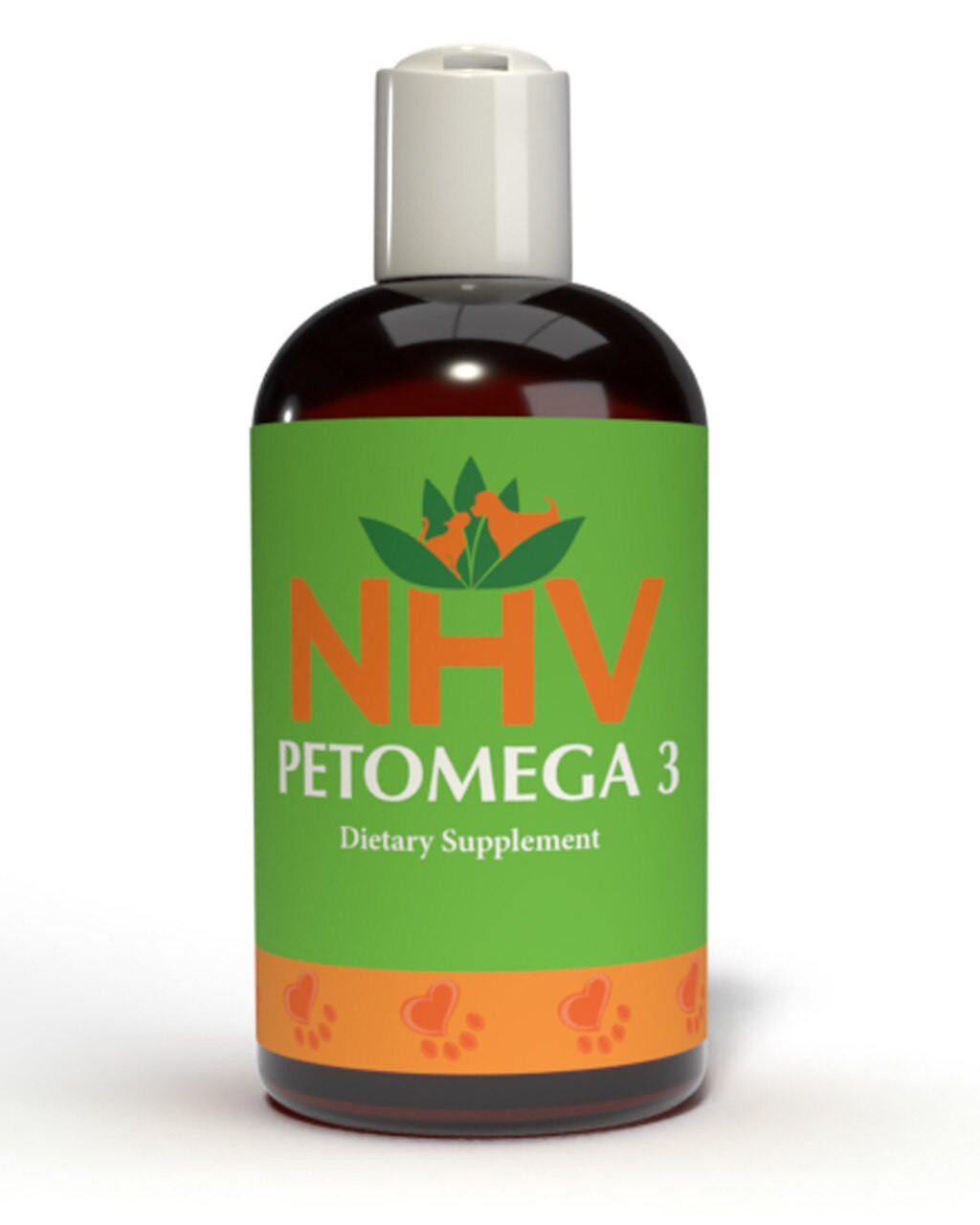
For Overall Health and Well-Being
buy 2 and save $3
Support your dog’s health with omega 3 fish oil for dogs. Help them maintain a healthy coat, eyes, joints, immune system and overall organ function.


Support your dog’s health with omega 3 fish oil for dogs. Help them maintain a healthy coat, eyes, joints, immune system and overall organ function.

Our omega 3 fish oil for dogs is a great source of EPA (Eicosapentaenoic Acid 600mg) and DHA (Docosahexaenoic acid 460mg) essential fatty acids. This fish oil supplement for dogs is derived from sardines, anchovies and North Atlantic cod liver oil. It is molecularly distilled and cold pressed to improve the bioavailability of the omega 3 fatty acids, and is medical and human grade quality.
Omega 3 fish oil for dogs may be beneficial for the following:
Processed pet foods have increased omega-6 fatty acids, and decreased omega-3 fatty acids. The University of Maryland Medical Center states, "It is very important to maintain a balance between omega-3 and omega-6 fatty acids in the diet. A proper balance helps maintain and even improve health." Your dog’s body cannot easily make essential fatty acids. It is vital to provide omega 3 fish oil for dogs as an added supplement to your pet’s daily diet.
The American Journal of Veterinary Medicine has published studies on the benefits of omega 3 fatty acids (fish oils) for arthritis and degenerative joint disease in dogs. The studies showed that dogs who were given omega 3 fatty acids had a significantly improved ability to get up from a resting position and marked improvement in walking ability.

Suggested Dosage: To be taken once per day. Add to food based on weight chart.
Therapeutic Dosage: Double the quantity for maximum period of 4 weeks or follow veterinarian advise.
Pet’s Weight Dosage
0-15 lb = ¼ tsp
15-30 lb = ½ tsp
30-60 lb = 1 tsp
60-90 lb = 1 ½ tsp
How to Administer: Shake well before use. The easiest method is to add the dosage to your pets food. Some pets can be finicky, if this occurs consider hiding the appropriate amount in food most pet’s love such as fish, chicken, yogurt, or a favorite treat. If your pet only eats dry food then soak kibbles at feeding time.
For Best Results
Dietary supplements are beneficial to the health and well-being of your pet and are safe for long-term use. Every pet responds to natural supplements differently, therefore it is important to be consistent and administer the product daily. Supplements generally take two to four weeks to take effect, however this will vary from one animal to the next.
Product Storage
All NHV Natural Pet Products contain no artificial additives, preservatives or coloring. Shelf life after opening is 6 months and must be refrigerated after opening.
Cautions and Contraindications
Avoid During Pregnancy.
Our omega 3 fish oil for dogs is a great source of EPA (Eicosapentaenoic Acid 600mg) and DHA (Docosahexaenoic acid 460mg) essential fatty acids. This fish oil supplement for dogs is derived from sardines, anchovies and North Atlantic cod liver oil. It is molecularly distilled and cold pressed to improve the bioavailability of the omega 3 fatty acids, and is medical and human grade quality.
Omega 3 fish oil for dogs may be beneficial for the following:
Processed pet foods have increased omega-6 fatty acids, and decreased omega-3 fatty acids. The University of Maryland Medical Center states, "It is very important to maintain a balance between omega-3 and omega-6 fatty acids in the diet. A proper balance helps maintain and even improve health." Your dog’s body cannot easily make essential fatty acids. It is vital to provide omega 3 fish oil for dogs as an added supplement to your pet’s daily diet.
The American Journal of Veterinary Medicine has published studies on the benefits of omega 3 fatty acids (fish oils) for arthritis and degenerative joint disease in dogs. The studies showed that dogs who were given omega 3 fatty acids had a significantly improved ability to get up from a resting position and marked improvement in walking ability.

Suggested Dosage: To be taken once per day. Add to food based on weight chart.
Therapeutic Dosage: Double the quantity for maximum period of 4 weeks or follow veterinarian advise.
Pet’s Weight Dosage
0-15 lb = ¼ tsp
15-30 lb = ½ tsp
30-60 lb = 1 tsp
60-90 lb = 1 ½ tsp
How to Administer: Shake well before use. The easiest method is to add the dosage to your pets food. Some pets can be finicky, if this occurs consider hiding the appropriate amount in food most pet’s love such as fish, chicken, yogurt, or a favorite treat. If your pet only eats dry food then soak kibbles at feeding time.
For Best Results
Dietary supplements are beneficial to the health and well-being of your pet and are safe for long-term use. Every pet responds to natural supplements differently, therefore it is important to be consistent and administer the product daily. Supplements generally take two to four weeks to take effect, however this will vary from one animal to the next.
Product Storage
All NHV Natural Pet Products contain no artificial additives, preservatives or coloring. Shelf life after opening is 6 months and must be refrigerated after opening.
Cautions and Contraindications
Avoid During Pregnancy.

Natures Immuno- blend of mushrooms that help support immune function
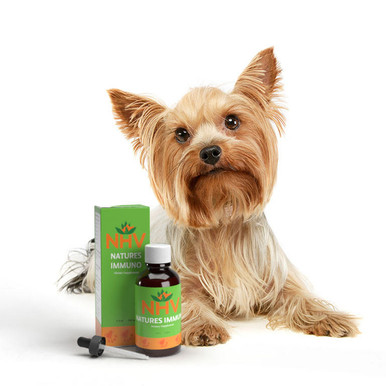
Natures Immuno- blend of mushrooms that help support immune function
Published: June 12, 2025